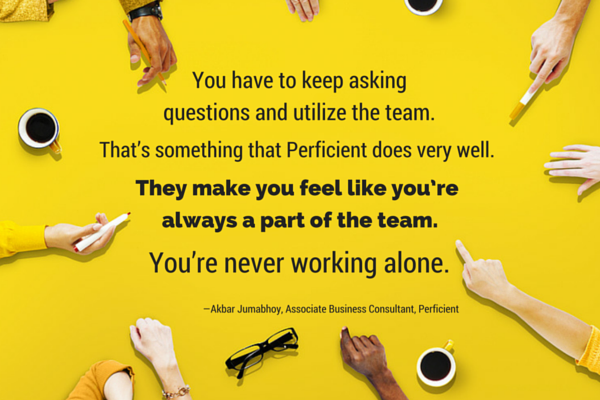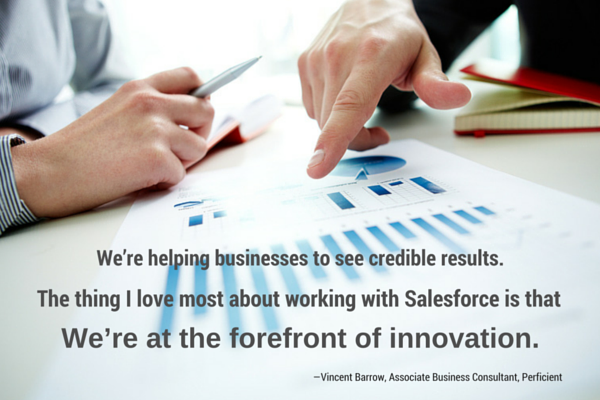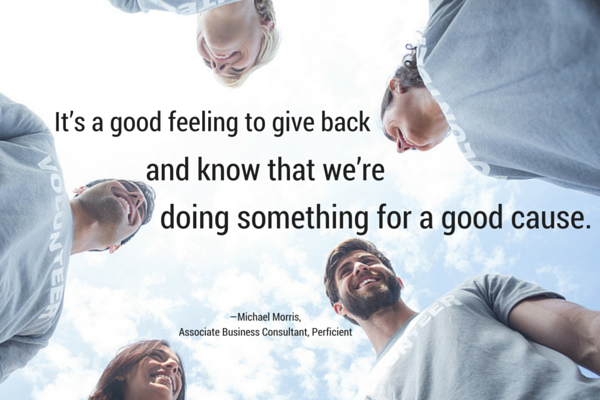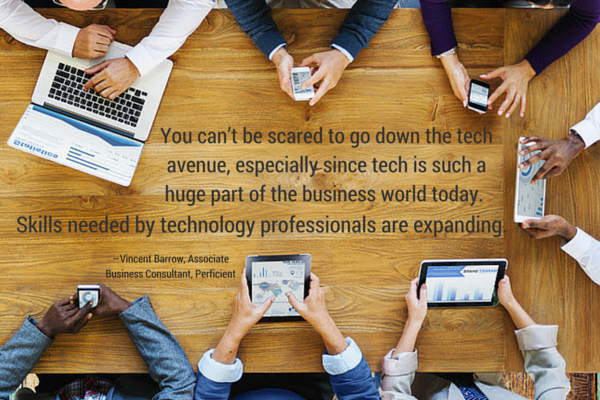 They’ve been on the job less than a year, but these four recent hires in our Salesforce practice say they’ve grown quickly in their new roles at Perficient.
They’ve been on the job less than a year, but these four recent hires in our Salesforce practice say they’ve grown quickly in their new roles at Perficient.
Akbar Jumabhoy, Michael Morris, Chad Wade, and Vincent Barrow recently shared their experiences in transitioning from college graduates to associate business consultants, the valuable career skills they’ve acquired in a short time, and opportunities to give back to the community along the way.
What are the big benefits of having Salesforce as part of your skill set?
Chad Wade: The Salesforce ecosystem is huge and is only getting bigger by the day. Having the skills to build business applications that meet the needs of an organization, across a number of industries, opens up a number of doors for me as I grow my career in the Salesforce ecosystem.
Michael Morris: By understanding Salesforce, you get a huge variety of different capabilities to support business processes. I’ve learned how everything ties together for a business, from employees and customers to how products work and leads and opportunities are managed. While an understanding of how businesses operate might seem really basic it’s valuable knowledge to have early on in my career.
Vincent Barrow: It’s exciting to see us build real-world solutions with the Salesforce platform for our clients. We’re helping businesses to see tangible results in the end, and the thing that I love the most about Salesforce is we get to be at the forefront of innovation.

What new technology skills have you acquired while on the job?
Chad Wade: During our initial interview process with Perficient, we were given a case study that was really interesting and challenging because it was really up to us how we went about completing the project. Our mentors helped guide us along the way, but wouldn’t tell us what to do. While there was a lot of trial and error, and discussions about possible solutions for each task, it taught me how to troubleshoot issues and arrive at a solution on my own.
Our pro-bono work on the non-profit Gubbio Project introduced me to some of the powerful cloud apps that are available for Salesforce. Using the Volunteers for Salesforce app, we were able to make an online volunteer sign-up form as well as a volunteer job/shift sign-up form.
Another project involved implementing Sales Cloud from scratch for a small sales team. The process of trial and error, asking questions, and taking chances on an idea all helped me identify solutions or tricks that Salesforce has.
The common thread is that each Salesforce project required working alongside a group of people who all have different skill sets, ideas, thought processes and approaches. When we are all working to solve the same issue, we each end up learning something new from each other, as well as coming up with solutions someone else might not have.
Michael Morris: One of the Salesforce projects I have worked on was a Community Cloud project. The solution allowed the company to track its clients and use knowledge assets to interact with others and / or create a case. We had to configure a lot of really tricky things with how cases are logged and how they get assigned to proper employees. I learned a lot about the service aspect of a business and see how a self-service community can work for our customers. I got to work with our Salesforce developers and also the experience design team on the user interface, so it was good to work with different people and not just other consultants.
On another project I’m currently working on I’ve had the chance to speak with the client directly, host meetings, and get their feedback. The client is starting with Salesforce from scratch. They’ve never used it before. It’s entirely new to them, so oftentimes they come to me for best practices and advice, so it’s been a great opportunity for me to share what I’ve learned so far and see their knowledge of Salesforce grow as well.

Akbar Jumabhoy: For the first several months at Perficient, it was a great all-around experience because I was focused on four different Salesforce projects shadowing our other consultants, and that allowed me to really build my Salesforce skills. I was dabbling with Sales Cloud for two projects and Service Cloud for two projects. I even got to go on-site to visit some clients as well.
Now, I’m working on a project that’s entirely different. Basically we’re building a territory planning app built on a Visualforce page from scratch. This is my first full-time project, and it’s just a small team of us. I get to be very involved with both the developers and the UI person providing input and helping to test the solution. It’s been a really interesting Salesforce project to dive into.
The coworkers in our office are very supportive. They’re always available when we have questions – and we have a lot of questions. Everybody is always there to help us. It’s been a great transition into using Salesforce.
Vincent Barrow: I had used Salesforce in previous jobs as a salesperson but never knew anything in terms of development on the platform. One of the projects that has had a huge impact on me involves Community Cloud. It happens to be one of the first Salesforce Communities using the new Community Builder templates, and that, for me, is something that’s very exciting. Many of Perficient’s Salesforce consultants specialize on a product, and that project showed me where I want to go further down the line. With Communities, not only is it a lot of fun to build, but it requires a lot of interaction with B2C customers, which, for me is a lot of fun. I learned a lot about the capabilities styling with cascading style sheets (CSS). Customizing community styles using CSS is something is rewarding because you’re able to visualize changes and see the results immediately within the Salesforce community.
Salesforce is a big believer in the philanthropic movement. How has Perficient used Salesforce to give back to the community?
Chad Wade: My first “real” customer was The Gubbio project. Two other new hires and I were tasked with providing pro-bono consulting work for the non-profit organization. The non-profit provides a place for the homeless to sleep in the pews of a Catholic church in between church services. We started the project by volunteering to cook a breakfast at 6am for the Gubbio project’s guests. The team came together, bought the groceries and cooked an amazing breakfast. After, we were all able to sit down and eat with the guests, it was one of the best moments I can recall.
Akbar Jumabhoy: Perficient’s pro-bono service helps charitable foundations run more efficiently than they are right now. The Gubbio project was an integral part of our on-boarding process and helped us get our feet wet. The team was so grateful and thankful for the work we did. Gubbio now has a whole system that’s fully functional where they can get as many volunteers as they can, reach out to as many people as they can and keep track of what it is that they’re actually doing. They do such great work in the community, and we’re glad to be a part of their effort.
Michael Morris: The project I’m working on right now is for the Homeless Prenatal Program (HPP), a family resource center that provides help to families who are trying to support their children, so they have shelter, food and a place for them to come and do all kinds of activities. The work we’re doing for them is specifically around managing the people who come in through Salesforce’s Nonprofit Starter Pack. HPP also tracks people’s progress in the program and relevant data, incoming food and people who are checking and checking out. It’s a good feeling to give back and know that we’re doing something for a good cause.

In looking back, what recommendations do you have for recent college graduates looking for a job in the industry?
Chad Wade: Apply for the job, even if you don’t think you are 100-percent qualified. I wouldn’t have thought I would be qualified for a Salesforce consulting job, but obviously Perficient thought I was. Take a chance; you have 0 percent chance of getting the job if you don’t apply.
Research the field and technologies involved with the jobs you are interested in. Learn about the technology’s features and capabilities. If you are going to pursue a job in technology make sure you are sincerely interested in it, because you will be using it every day.
Akbar Jumabhoy: If your school offers on-campus recruiting, go to the career fairs. Meet people and start a line of communication with them. If your school doesn’t offer on-campus recruiting, get online and learn more about the companies you are looking into and how they recruit. You have to get really involved and find out what kind of events they host and how you can get involved to meet people, connect with them on LinkedIn, whatever it takes. It’s not easy getting a job in the tech industry. It’s a lot of hard work, and you just have to keep working at it.
Michael Morris: Take your job hunt seriously. The tech world is competitive so it’s really important to polish up on professionalism and how to engage properly. Once you get a job in the tech world, it’s important to learn as much as you can and keep current on the latest trends and skills There are endless resources out there to keep you up to speed as long as you make the time. Read, read, read – always read.
Vincent Barrow: You can’t be scared to go down the tech avenue, especially since tech is such a huge part of the business world in general. As a result, skills needed by technology professionals today are expanding.
If people are worried to go down this road because they don’t have that much experience, you’ve really got to put that aside. At the end of the day, it is a business, and businesses are eager to get their hands on young, bright individuals possessing the capacity to grow their knowledge and skills with the organization. It’s worth trying and putting forth the effort. At the end of the day, you really don’t know for sure what’s going to happen.

What skills or know-how do you think are necessary in order to continue to grow your career in the Salesforce ecosystem? How do you continue to make yourself an asset at Perficient?
Chad Wade: Persistence and curiosity are probably the most important things that I can think of. Some aspects of learning Salesforce are difficult, like formulas and Visual Workflow, but by sticking with it and trying different things to solve the issue, you usually find the answer. Curiosity is probably the most important for me because the capabilities and features are almost endless. By playing around and clicking on everything in Salesforce I have probably discovered more than I could have reading or taking a class.
Akbar Jumabhoy: You just have to get as involved as you possibly can on a project, especially when you’re just starting off. I just kept going around and asking people how I could help them, and I found that was the best way to learn. When you’re first starting out, you want to make sure that you’re covering all your bases and make sure you have a solid foundation to expand upon. Start by understanding Sales Cloud, expand your knowledge into Service Cloud and don’t be afraid to explore Communities.
I find the best way to learn is to simply dive in. You have to keep working and keep helping. I worked my way up to the point where I could be on a project after only being with Perficient for a couple of months.
You have to keep asking questions and utilize the support from your team. That’s something that Perficient does very well. They make you feel like you’re always a part of the team, and that you’re never working alone. Continue to get involved in all of the projects that you can and keep building up your skill level and that way, over time, you can gain more and more responsibility.
Michael Morris: Always make sure you’re asking questions. Understanding the responsibility that’s given to us, and getting your work done on time. It’s OK to make a mistake, but try not to make the same mistake twice. Always double and triple check to make sure what you’re doing is right.
Hats off to all of the people here who have more experience, and aside from their busy projects that they’re working on, take the time to help us. It gives us a chance to understand everything they’ve worked on and reminds us that we always have more to learn.
Interested in working for Perficient’s Salesforce practice? Visit perficient.com/careers to learn more and browse current job openings.
Follow our Life at Perficient blog on Twitter via @PerficientLife.
Connect with us on LinkedIn here.
